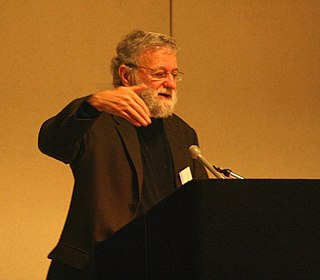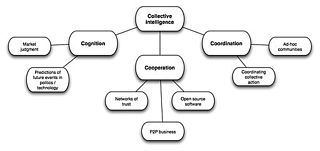In computer science, artificial intelligence (AI), sometimes called machine intelligence, is intelligence demonstrated by machines, in contrast to the natural intelligence displayed by humans and animals. Computer science defines AI research as the study of "intelligent agents": any device that perceives its environment and takes actions that maximize its chance of successfully achieving its goals. Colloquially, the term "artificial intelligence" is used to describe machines that mimic "cognitive" functions that humans associate with other human minds, such as "learning" and "problem solving".

Cognitive science is the interdisciplinary, scientific study of the mind and its processes. It examines the nature, the tasks, and the functions of cognition. Cognitive scientists study intelligence and behavior, with a focus on how nervous systems represent, process, and transform information. Mental faculties of concern to cognitive scientists include language, perception, memory, attention, reasoning, and emotion; to understand these faculties, cognitive scientists borrow from fields such as linguistics, psychology, artificial intelligence, philosophy, neuroscience, and anthropology. The typical analysis of cognitive science spans many levels of organization, from learning and decision to logic and planning; from neural circuitry to modular brain organization. The fundamental concept of cognitive science is that "thinking can best be understood in terms of representational structures in the mind and computational procedures that operate on those structures."
Cognitive psychology is the scientific study of mental processes such as "attention, language use, memory, perception, problem solving, creativity, and thinking". Much of the work derived from cognitive psychology has been integrated into various other modern disciplines such as Cognitive Science and of psychological study, including educational psychology, social psychology, personality psychology, abnormal psychology, developmental psychology, linguistics, and economics.
Educational psychology is the branch of psychology concerned with the scientific study of human learning. The study of learning processes, from both cognitive and behavioral perspectives, allows researchers to understand individual differences in intelligence, cognitive development, affect, motivation, self-regulation, and self-concept, as well as their role in learning. The field of educational psychology relies heavily on quantitative methods, including testing and measurement, to enhance educational activities related to instructional design, classroom management, and assessment, which serve to facilitate learning processes in various educational settings across the lifespan.

Donald Arthur Norman is a researcher, professor, and author. Norman is the director of The Design Lab at University of California, San Diego. He is best known for his books on design, especially The Design of Everyday Things. He is widely regarded for his expertise in the fields of design, usability engineering, and cognitive science. He is a co-founder and consultant with the Nielsen Norman Group. He is also an IDEO fellow and a member of the Board of Trustees of IIT Institute of Design in Chicago. He also holds the title of Professor Emeritus of Cognitive Science at the University of California, San Diego. Norman is an active Distinguished Visiting Professor at the Korea Advanced Institute of Science and Technology (KAIST), where he spends two months a year teaching.
Metacognition is "cognition about cognition", "thinking about thinking", "knowing about knowing", becoming "aware of one's awareness" and higher-order thinking skills. The term comes from the root word meta, meaning "beyond", or "on top of". Metacognition can take many forms; it includes knowledge about when and how to use particular strategies for learning or problem-solving. There are generally two components of metacognition: (1) knowledge about cognition and (2) regulation of cognition.

James Lloyd "Jay" McClelland, FBA is the Lucie Stern Professor at Stanford University, where he was formerly the chair of the Psychology Department. He is best known for his work on statistical learning and Parallel Distributed Processing, applying connectionist models to explain cognitive phenomena such as spoken word recognition and visual word recognition. McClelland is to a large extent responsible for the large increase in scientific interest for connectionism in the 1980s.

The following outline is provided as an overview of and topical guide to thought (thinking):

Carol S. Dweck is the Lewis and Virginia Eaton Professor of Psychology at Stanford University. Dweck is known for her work on the mindset psychological trait. She taught at Columbia University, Harvard University, and the University of Illinois before joining the Stanford University faculty in 2004.

Philip E. Tetlock is a Canadian-American political science writer, and is currently the Annenberg University Professor at the University of Pennsylvania, where he is cross-appointed at the Wharton School and the School of Arts and Sciences.

Collective intelligence (CI) is shared or group intelligence that emerges from the collaboration, collective efforts, and competition of many individuals and appears in consensus decision making. The term appears in sociobiology, political science and in context of mass peer review and crowdsourcing applications. It may involve consensus, social capital and formalisms such as voting systems, social media and other means of quantifying mass activity. Collective IQ is a measure of collective intelligence, although it is often used interchangeably with the term collective intelligence. Collective intelligence has also been attributed to bacteria and animals.

Susan Goldin-Meadow is the Beardsley Ruml Distinguished Service Professor in the Departments of Psychology, Comparative Human Development, the College, and the Committee on Education at the University of Chicago. She is the principal investigator of a 10-year program project grant, funded by the National Institute of Child Health and Human Development, designed to explore the impact of environmental and biological variation on language growth. She is also a co-PI of the Spatial Intelligence and Learning Center (SILC), one of six Science of Learning Centers funded by the National Science Foundation to explore learning in an interdisciplinary framework with an eye toward theory and application. She is the founding editor of Language Learning and Development, the official journal of the Society for Language Development. She was President of the International Society for Gesture Studies from 2007–2012.
David Leigh Waltz was a computer scientist who made significant contributions in several areas of artificial intelligence, including constraint satisfaction, case-based reasoning and the application of massively parallel computation to AI problems. He held positions in academia and industry and at the time of his death, was a professor of Computer Science at Columbia University where he directed the Center for Computational Learning Systems.
Cognitive bias mitigation is the prevention and reduction of the negative effects of cognitive biases – unconscious, automatic influences on human judgment and decision making that reliably produce reasoning errors.
Rayid Ghani is the Director of the Center for Data Science and Public Policy, Research Associate Professor in the Department of Computer Science, and a Senior Fellow at the Harris School of Public Policy at the University of Chicago. He was also the co-founder of Edgeflip, an analytics startup that grew out of the Obama 2012 Campaign, focused on social media products for non-profits, advocacy groups, and charities.
Aggregative Contingent Estimation (ACE) was a program of the Office of Incisive Analysis (OIA) at the Intelligence Advanced Research Projects Activity (IARPA). The program ran from June 2010 until June 2015.
Barbara Mellers is I. George Heyman University Professor in the psychology department at the University of Pennsylvania. Her research focuses on decision processes.

Amir Hussain is a cognitive scientist, the director of Cognitive Big Data and Cybersecurity (CogBID) Research Lab at Edinburgh Napier University He is a professor of computing science. He is founding Editor-in-Chief of Springer Nature's internationally leading Cognitive Computation journal and the new Big Data Analytics journal. He is founding Editor-in-Chief for two Springer Book Series: Socio-Affective Computing and Cognitive Computation Trends, and also serves on the Editorial Board of a number of other world-leading journals including, as Associate Editor for the IEEE Transactions on Neural Networks and Learning Systems, IEEE Transactions on Systems, Man and Cybernetics (Systems) and the IEEE Computational Intelligence Magazine.










